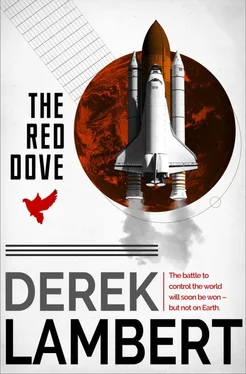‘If you’re having one,’ Massey said.
‘A word of warning,’ Drabkin said, pouring vodka into two none-too-clean glasses. ‘Whenever you drink fire-water stoke the fires. In other words eat, Comrade Massey.’ From a biscuit tin he took a handful of small salted crackers and put them in a saucer on the table between the two armchairs. ‘Nasdarovya.’ He raised his glass.
‘Mud in your eye.’
They each drank half the measures of vodka, washed them down with mineral water and bit into their crackers.
‘What you are suggesting is quite incredible,’ Drabkin remarked.
Massey assumed that the conversation was still being recorded. Friendship was not being tentatively proffered. The hot-cold technique, as old as interrogation itself, so he had been told at Camp Peary.
Drabkin ran one finger through his fringe of black hair. ‘I’m not really “into computers” as you put it. But could we really penetrate a computer system as sophisticated as Vandenberg’s?’
Massey said: ‘Look, I’m not “into computers” either. I can only interpret Vogel. According to him, all you need is a communication terminal, i.e. a distant terminal from which you can make contact with a central computer system, i.e. Vandenberg.’
Drabkin refilled Massey’s glass; not his own, Massey noted. ‘Come now, Comrade Massey, there must be more to it than that.’
‘Not, as I understand it, if you have (1) a terminal identification number; (2) a key code; (3) a data code.
‘You say Vogel has access to such codes?’
‘Sure he does, but they’re changing all the time.’
‘How would he convey these codes to us?’
Massey smiled at Drabkin. ‘He wouldn’t.’ He sipped his vodka, crunched up another cracker.
‘I don’t understand.’
‘If your computer experts and Vogel set up a two-way communications system then I could become… dispensable. I wouldn’t want that, Comrade Drabkin, so I’ve taken precautions to make sure that Vogel will only communicate with me. That also puts me in a strong bargaining position.’
‘Bargaining?’ Drabkin lunged again with the vodka bottle but Massey pushed his hand away. ‘You are seeking asylum, yes?’
‘More.’
Drabkin frowned. The splash of vodka into his own glass disturbed the gathering silence. Finally Drabkin broke it: ‘What more could you possibly want. Money?’
‘A very bourgeois observation. I was thinking on a much higher plane.’
Patches of red had appeared on Drabkin’s pale cheeks. Vodka or anger or both. ‘Please be more precise, Mr Massey.’
‘Very well. I want to return to space. I’m giving you access to the United States military programme for space: in return I want to be taken to Tyuratam and retrained as a cosmonaut.’
Massey returned to the room provided for him in an annexe in Dzerzhinsky Square at 5.14 p.m. By 5.20 Vlasov and Peslyak were listening to a tape of his final exchanges with Drabkin.
After he had expressed his wish to return to space, Drabkin said: ‘So, if you are to be believed, the Soviet Union could ultimately obtain details of all the United States’ classified military material in space.’
Massey replied: ‘I think you’ve missed the point but I doubt whether others listening to the tape have…’
Peslyak glanced at Vlasov; Vlasov stared back impassively.
‘…It’s not a question of extracting information, it’s a question of inserting it. Input not output. By feeding Vandenberg’s computers incorrect information you could totally wreck the American space programme. You would then command space – and thus the world.’
Drabkin and Massey parted company. A door closed. The tape ran out.
Vlasov stood up and walked to the window. The sky was dark with a few clear black pools among the clouds. ‘Crazy, Comrade Peslyak?’
‘Still highly suspect.’
‘There will be other interrogations. Narcoanalysis, hypnosis. Meanwhile I’m going to try something more practical.’
Peslyak looked at him inquiringly.
‘I’m going to see if Massey’s scheme works.’
To see if he really is the vehicle to follow the direction indicated by the President.
My salvation!
Vlasov stared into the sky. From one of the black pools a star glittered back at him.
In a small house located in coastal desert in south California, forty-two miles south-west of Santa Barbara, Daniel S. Vogel, Director of Communications at Vandenberg Air Force Base, lay in bed fighting the temptation to take his temperature.
Like many men and women who seek perfection in their calling – in Vogel’s case computers – he had allowed a personal weakness to run riot.
That weakness was hypochondria. ‘I’ve got it so bad,’ he once told a friend, ‘that I’m hypochondriac about hypochondria.’
It was at its worst when he was worried. And this morning he was very worried. Often his wife could dispel the fears about his health, but not this morning; with the new day only a green rim on the horizon it wouldn’t be fair to wake her.
His mouth felt dry, his eyes tired despite eight hours’ sleep. Had he got a fever? Only the cool, mercury-filled bulb of a thermometer beneath his tongue could answer the question. And the pulse, of course. He didn’t have to take that: he could hear it against the pillow. As he listened it began to gallop.
Don’t give in to the temptation. Lying on his back so that he couldn’t hear his heartbeat, Vogel forced his thoughts away from the symptoms of fever, away from the crisis that lay ahead of him later that day, and guided them towards his vision, his refuge.
It was Vogel’s ambition to be alive when the UIM was perfected, UIM representing Ultra-Intelligent Machine.
The UIM, he figured, would be a reality within the next twenty years; that would put him at around seventy, well within the average life expectancy if, that was, his health held out.
But there were many obstacles ahead. Not the least of them the speed of light which limited electronic signals within a machine to around 300,000 kilometres a second, thus making computerised brains slower than their human counterparts that could process thousands of impulses simultaneously. And Mankind’s own resistance to producing a phenomenon that could be as intelligent as himself, and, one day, more intelligent.
Vogel, however, believed there was a more immediate and much more dangerous obstacle. Communism. The future was computers, of this there was no doubt. But, because its system stifled enterprise, Russia was at least a decade behind the West in electronics.
Vogel feared that, appreciating this fatal flaw in its scheme of things, the Soviet Union might launch a limited nuclear attack on the United States to redress the balance. Thereby aborting the birth of the UIM within his lifetime and retarding, perhaps annihilating, a computerised future or, for that matter, any future at all.
Vogel had therefore offered his brain, and his machines’ brains, to the United States Government, which had accepted gratefully, because Daniel Vogel was acknowledged to be the best in his field, and posted him to Vandenberg Air Force Base, also known as the Western Test Range, on the Californian coast.
Ten thousand Service personnel and their families live at Vandenberg. It is not only a launch site for shuttles, spy satellites and other items of esoteric hardware, it is a storehouse for intercontinental ballistic missiles housed in underground silos; as such it is not the most popular posting in the United States Air Force.
But it was not the pressure of the IBMs or the threat of an attack by Soviet missiles that bothered Daniel Vogel this fine late November morning. What concerned him so acutely was the first phase in an exercise in computerised disinformation that was to be launched later in the day. An exercise on a scale never attempted or envisaged before. An exercise that scared the shit out of Daniel Vogel.
Читать дальше
Конец ознакомительного отрывка
Купить книгу












